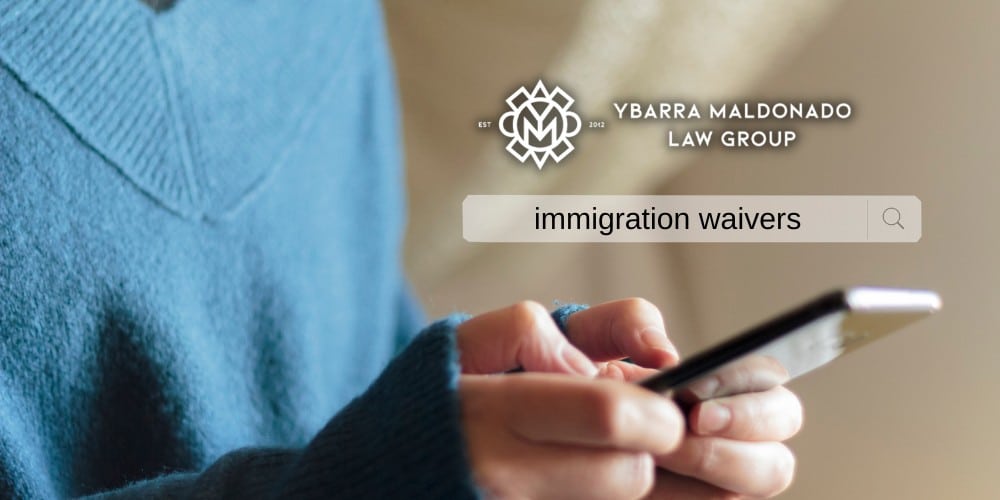PHOENIX IMMIGRATION WAIVERS ATTORNEY
DON’T HESITATE TO REACH OUT TO US!
Our Law Firm is committed to becoming the best Law Firm for Latino, migrant, and Spanish speaking communities in Arizona.
Immigration Waiver Lawyer in Phoenix, AZ

When it comes to the intersection of criminal law with immigration law, the two can greatly affect each other. Having a single or multiple criminal convictions can strongly impact your immigrant visa status, as well as your ability to stay in the country. Certain crimes, such as crimes involving moral turpitude and aggravated felonies, can affect even a lawful permanent resident. These crimes can also make someone subject to deportation. One of the answers to this issue is the various immigration waivers that exist.
The attorneys at Ybarra Maldonado Law Group have a record of success in obtaining waivers for our clients. We know how to build these cases and make them convincing. If you were already denied a waiver once, we can help you make your case stronger. Our team works with both you and your family to file for the correct waiver, collect the necessary evidence, and submit the documentation you need. Contact us at 602-910-4040 to schedule a case evaluation with an experienced immigration lawyer in Phoenix.
What Is an Immigration Waiver?
A Waiver, also known as a Waiver of Inadmissibility, is a pardon for a violation of immigration policy. If you are inadmissible to the U.S. but want to apply for a visa, you need a waiver. You could be inadmissible to the U.S. if you:
- Are in poor health
- Have a criminal background
- You pose a risk to national security
- You are likely to become a public charge, meaning you will need government assistance
- Are missing a required labor certification
- In prior immigration documents you committed fraud and misrepresentation
- You were already removed from the U.S.
- You are not in the U.S. legally
There are other miscellaneous reasons you could also be considered inadmissible to the U.S. If you apply for and receive a waiver, you may be able to stay in the U.S. for longer and possibly apply for a visa.
Types of Immigration Waivers

There are a few different types of immigration waivers, and they all have specific purposes and eligibility requirements. If you are facing deportation or grounds of inadmissibility for any of the following reasons, you may benefit from immigration waivers.
- Health-related grounds
- Bars due to unlawful presence in the United States
- Certain criminal and related grounds
- Membership in a totalitarian party
- A physical or mental disorder of public health significance
- Serious criminal grounds, such as human trafficking
- Controlled substance traffickers
- Those convicted of immigration fraud, misrepresentation, or other previous immigration violations
Many lawful permanent residents who are faced with being forced to leave the country have benefitted from filing one of the available immigration waivers. In the following sections, we describe each type of waiver, its purpose, and the requirements for filing.
212c Waiver to Avoid Deportation After a Criminal Conviction
It is possible for someone with lawful permanent residence status to face the possibility of deportation because of a past criminal conviction. While this seems unfair, the language that Congress has used in the Immigration and Naturalization Act allows for deportation of those who pleaded guilty of a crime before April 1, 1997. The Supreme Court upheld this language in INA 212 during a 2001 court case.
A section 212c waiver allows a lawful permanent resident to apply for relief from removal proceedings based on criminal and related grounds. In order to apply for an INA 212c waiver, you must meet the following requirements.
- Pled guilty to a crime prior to April 1, 1997.
- Haven’t been convicted of a firearms offense or of an aggravated felony for which you served more than 5 years of time.
- Have been a lawful permanent resident for at least 5 years.
- Not in the United States unlawfully because of previous immigration violations.
- Not subject to removal on the grounds of homeland security or acts of terrorism.
- Returning to an unrelinquished, legal residence of at least 7 years.
Keep in mind that this is a discretionary decision, meaning the immigration court judge will decide whether or not to admit you back into the United States. Even if you are fully eligible, the judge has the final say. However, working with an immigration lawyer can help you build a strong case in favor of your admission to the country.
212h Waiver of Inadmissibility
Immigration law outlines certain grounds of inadmissibility that bar someone seeking permanent residence from being admissible to the country. However, the following four circumstances allow an immigrant alien to apply for these immigration waivers.
- If denying one’s admissibility would result in extreme hardship to their spouse, children, or parent who is a lawful permanent resident.
- When the criminal conviction in question is at least 15 years old or if it only involves prostitution, and the petitioner is found to be rehabilitated.
- If the petitioner is a Violence Against Women Act (VAWA) self-petitioner.
- When the waiver is used as a defense against deportation and to waive a previous conviction.
Keep in mind that not all criminal convictions will benefit from this waiver. Speak with an experienced immigration lawyer to find out whether or not you can benefit from a 212h waiver.
I-601a Unlawful Presence Waiver
The I-601 and I-601a waivers are two of the most commonly-used immigration waivers. They are unlawful presence waivers. One can seek an I-601 waiver if they are currently inadmissible but they wish to apply for an immigrant visa, adjustment of status, or other immigration benefits. Many immigrants only learn of their inadmissibility after they apply for their immigrant visa and receive a rejection from USCIS. This can be a very disheartening experience.
Luckily, the Phoenix immigration lawyers at Ybarra Maldonado Law Group are here to help you navigate the process of submitting your waiver. Visit our I-601 unlawful presence waiver page to learn more. An I-601a waiver is similar to an I-601 waiver, except that the 601a is reserved for those who have immediate family members with green cards or citizenship.
INA 212d Waiver of Inadmissibility for Non-Immigrants
Some immigrants only wish to be in the United States temporarily, such as for those entering the country for skilled or unskilled labor, or on a student visa. An INA 212 d waiver can waive nearly any grounds of inadmissibility, including the following.
- Drug crimes conviction
- Health-related grounds
- Aggravated felonies
- Immigration fraud
- Crimes involving moral turpitude (CIMT)
How Do I Qualify for a Waiver?

There are various types of Waivers. It is best to speak with an experienced Immigration Attorney with experience in filing Waivers to find out which type is right for you. The requirements will depend on the type of waiver you are applying for. Some of the most common things you might need to prove:
- You or your U.S. citizen or legal permanent resident spouse, parent, or the K visa petitioner would suffer extreme hardship if the application were denied.
- You must provide evidence of this family relationship with marriage or birth certificates.
- Your health has improved if you are inadmissible for health reasons.
- This could include medical records and doctor’s notes.
- You are at least 17 years old.
The applicant must provide extensive personal information on your application including your address, alien number if applicable, country of origin and other biographical information. Additionally, you must disclose all reasons you might be considered inadmissible.
The most common form of waiver is Form I-160. Form I-601 is the Application for Waiver of Grounds of Inadmissibility. It is filed outside of the U.S. Form I-601a is the Application for Provisional Unlawful Presence Waiver. It is filed while in the U.S.
What Is Extreme Hardship?
You’ll hear the term “extreme hardship” in relation to waivers. What is extreme hardship and how can you meet that requirement?
The applicant must show that denial of the waiver will cause “extreme hardship” to the immediate relative of the applicant. The person that will experience “extreme hardship” must be a U.S. citizen or legal permanent resident. However, U.S. law does not clearly define “extreme hardship.” In most cases, the decision as to what counts as “extreme hardship,” depends on the opinion of the USCIS officer handling your application. Some possible extreme hardships could include:
Health
Your immediate relative is in poor health, requires specialized ongoing treatment, and cannot travel. Your presence in the U.S. is essential for their health.
Political Uproar or War
The applicant’s country is currently experiencing war or major political upheaval.
Financial Considerations
This does not include simple financial inconvenience. Rather, the family member must be under threat of losing future employability, loss due to sale of a loss or business, cost of care of family members, or other considerations.
Educational Opportunity
A family member will suffer loss of opportunity for higher education, lower quality education, or has an inability to speak foreign language.
Additional Family and Community Ties
In all cases, “extreme hardship” must be worse than the normal hardship expected from family separation or financial inconvenience from deportation. There is a lot of documentation required to establish extreme hardship. Speak with an experienced immigration attorney to find out if you qualify for a Waiver due to possible extreme hardship.
Merits Hearing
A Merits Hearing could take anywhere from a few hours to multiple days. The government and the foreign national present testimony from witnesses and outline their arguments for or against deportation. Each side may cross-examine witnesses. The judge might ask questions and then decide whether the individual may remain in the U.S. Both the foreign national and ICE may appeal the decision within 30 days.
Appeals, Motions to Reopen or Reconsider
An individual may appeal the judge’s decision within 30 days. ICE may also appeal a decision within the same time frame. In some cases, if the foreign national finds new evidence that would support their case after the 30 days, he or she can file for a Motion to Reopen.
Deportation
If an individual receives a final removal order, ICE flies or busses them to the border. ICE flies foreign nationals to their home countries not bordering the U.S.
How Do I Apply for a Waiver?

In addition to completing the necessary form, you will also need to provide evidence of extreme hardship. This could include:
- Expert opinions
- Medical or mental health tests and evaluations by licensed professionals
- Documents of identity and family relationships
- Birth certificates
- Marriage certificates
- Adoption papers
- Other court documents
- Photographs
- Evidence of employment or business ties
- Payroll records
- Tax statements
- Bank records and other financial records
- Community organizations
- Volunteer activities
- Cultural groups
- Newspaper articles and reports
- Your own personal testimony
- Affidavits and statements that are signed “under penalty of perjury,”
- Relevant letters from the applicant or any other person
If you are filing in the U.S. you will need to appear for a biometrics appointment.
How Long Does It Take for a Waiver To Be Approved?
Again, this will depend on the type of Waiver you are applying for and your personal circumstances. Other factors include how long it takes you to collect evidence and fill out the application. In many cases, it takes several months. Trying to build a case on your own might end up wasting your time and money if you don’t know how the process works. Enlisting the help of an experienced immigration attorney with extensive knowledge of waivers will help you achieve your goals faster.
Contact Experienced Immigration Waiver Lawyers Today
Do not wait to start your Waiver application with the help of the passionate, experienced immigration attorneys at Ybarra Maldonado Law Group. Contact us for a case evaluation regarding your immigration waiver, your immigrant visa, or other aspects of immigration law. We have extensive experience helping aspiring immigrants and existing LPRs defend their right to remain in the country. To schedule your case evaluation, please call our Phoenix law office at 602-910-4040 today.
TELL US YOUR STORY.

